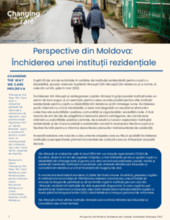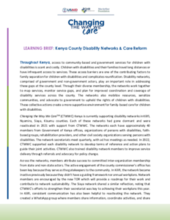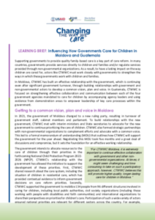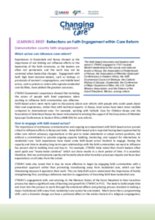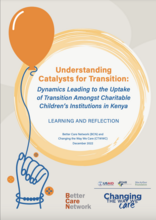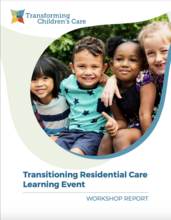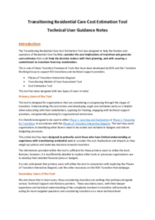Displaying 41 - 50 of 691
După 60 de ani de activitate în calitate de instituție rezidențială pentru copii cu dizabilități, Școala-Internat Auxiliară Hîncești (SIA Hîncești) din Moldova și-a închis, în cele din urmă, ușile în mai 2022. Închiderea SIA Hîncești și reint
This learning brief shares learning from Kenya around the barriers that contribute to family separation for children with disabilities and how disability networks are working to create a supportive environment for family-based care for these children.
This learning brief was developed as part of the CTWWC 2021 annual report and shares learning from two demonstration countries, Moldova and Guatemala. It showcases how care reform is led by government and how to influence different government actors.
This learning brief was developed as part of the CTWWC 2021 annual report and shares learning from demonstration countries on how to engage and bring faith actors into care reform.
After 60 years of serving as a residential institution for children with disabilities, the Hîncești Auxiliary Boarding school (SIA Hîncești) in Moldova closed its doors to children in May 2022. The closing of Hîncești SIA serves as a harbinger for what is possible for other institutions for children with disabilities in Moldova and around the world.
This study was designed to be a small insights-based qualitative learning and reflection study to explore catalysts for transition. It was based on interviews conducted with Charitable Children’s Institutions’ (CCI) directors that sought to identify and explore the range of factors that influenced each director’s decision to transition their residential care services, and the interplay between those factors.
This report captures the key insights, trends, learnings, and participant inputs from the Transitioning Residential Care Services Learning Event held in October 2022 which was organized and hosted by the Transitioning Residential Care Working Group as part of the Transforming Children’s Care Global Collaborative Platform.
Throughout the Transitioning Residential Care Cost Estimation Tool, comments and tool tips have been provided for those Primary Users and for the basic use of the tool itself. This guidance provides additional context and explanation for Technical Users.
The Transitioning Residential Care Cost Estimation Tool was designed to help you consider the cost implications of #transition and generate an estimate to help with planning & securing a commitment to transition from key stakeholders.

